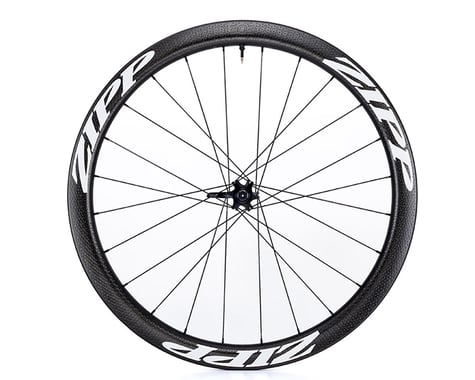•Zipp Tubeless valve extender and valve-core wrench•Zipp rim tape (factory taped)•Zipp Tangente quick-release skewer•Zipp thru-axle end caps
- Available in 10/11-speed cassette body
- SRAM XDR driver body for 177D available separately.
FIRECREST® – A BETTER WHEEL IN EVERY WAY:
Our proprietary Firecrest® rim rewrote the fundamentals of wheel making, resulting in improved aerodynamics, ride quality, wheel strength and stability in even the strongest of crosswinds. As a result, the entire Firecrest family of wheels makes a bigger difference in more ways than ever.
More speed.
Firecrest technology, discovered as we developed our Carbon Clinchers, refocused our thinking to concentrate not only on the front half of the wheel, but also the back half. Previous rim shapes were designed to smooth airflow coming off the tire, and tapered inward from the widest point of a toroidal bulge. But Firecrest rims have a less pronounced bulge and maintain a near-constant width almost all the way to the spoke bed. Without giving up the proven benefits of the toroidal shape, Firecrest is the first aero profile that effectively controls airflow around the back half of the wheel.
The performance benefits are substantial. At 1,375 grams, the 202 Firecrest Carbon Clincher (32mm rim depth) is the lightest in Zipp’s Carbon Clincher lineup and is a plucky all-around performer that floats up mountains and provides superior aerodynamics on the flats and descents. The 303 Firecrest (45mm rim depth) has become the go-to wheel for the Omega Pharma – Quick-Step Cycling Team at the Spring Classics and the wheel of choice for many of the women on Team Exergy TWENTY12. With Firecrest, the 404 Firecrest Tubular (58mm rim depth) matches the aero performance of the pre-Firecrest 808 (82mm depth). And what of the 808 Firecrest? Australian Pete Jacobs provided us with the answer, blasting the 112 mile cycling leg at Kona a pair of 808 Firecrest wheels to capture the 2012 Ironman® World Championship. “The crosswinds were never blowing me across the road. I always felt in control,” Jacobs said. “During the race I was thinking, “Wow, these 808s feel great.”
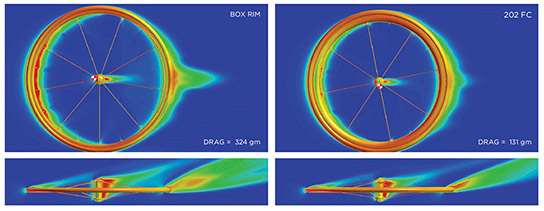
We used Computational Fluid Dynamics (CFD) post-processing capabilities to maximize aerodynamics and minimize wind-induced steering torque, resulting in a 202 Firecrest Carbon Clincher (right) that is faster and better handling than a classic box-section road wheel (left). Our Firecrest rim shape improves stability by moving the wheel’s center of pressure (represented in red/white) aft and downward to sit almost directly over the steering axis, where wind-induced steering torque has a minimal effect. CFD analysis also demonstrates how our proprietary Firecrest rim shape results in significantly less wind drag -- 131 grams for the 202 Firecrest, compared with 324 grams for the classic road wheel. Such use of CFD software throughout the development of the Firecrest line helped us create better prototypes to take to the wind tunnel, resulting in the world’s most aerodynamic and stable wheels.
More stability.
During the design process for Firecrest, we realized that the advanced mathematics and massive computing power that helped us create a faster wheel could also help reduce the impact of crosswinds on handling. Using computational fluid dynamics (CFD) software, we’ve discovered subtle variations in rim shape that improve stability without increasing aerodynamic drag. By moving the center of pressure – the focal point of side forces on the rim – to its optimal location near the steering axis, Firecrest offers stable, predictable handling at every wind angle. With the 202 Firecrest Carbon Clincher, we’ve achieved a near neutral steering torque. In real-world conditions, Firecrest rims are markedly more stable than other rims of equal or even shallower depth.
More strength.
As we discovered when developing the Zipp 303 to thrive under unforgiving conditions at the Spring Classics, a wider rim increases lateral stiffness for sprinting and cornering yet offers greater vertical compliance for more control, comfort, and durability on rough surfaces. The same holds true for Firecrest rims. The 303 Firecrest is a proven performer on the open road, cobblestones or rough cyclocross courses. In both tubular and Carbon Clincher versions, the wider design places more rubber on the road while cornering without adding rolling resistance. The new 202 Firecrest Carbon Clincher uses a new resin system that builds on Firecrest’s foundation of strength.
CARBON CLINCHERS - A NEW CHAPTER IN SPEED.
Zipp Carbon Clinchers have been described as the most heavily anticipated wheels of all time. During the two-year development process, we designed new clincher-specific approaches to prototyping, testing, materials, and manufacturing. The end result is worth the wait.
Optimized materials
When a wheel with carbon braking surfaces encounters a long, technical descent, spikes in rim temperature and tire pressure can impact braking and handling – especially with carbon clinchers. To solve this challenge, chemists and engineers from our composites supplier made repeated visits to Zipp and developed an exclusive heat-resistant resin based on the materials used in motorsports brake systems. This proprietary technology improves heat dissipation so substantially that all Zipp Carbon Clinchers pass stringent CEN safety standards without any limitations on rider weight or brake pad choices – a certification that no other full-carbon clincher wheelsets have achieved.
Optimized aerodynamics
Wind tunnel development is a cornerstone of how Zipp creates the world’s fastest wheels. Using semi-structural prototypes, we can quickly and accurately evaluate dozens of potential rim shapes. But the prototyping technology that works for tubulars can’t support fully inflated clinchers. So we developed an entirely new system where plastic skins are applied to a fully structural interior skeleton. This allowed us to refine carbon clincher rim shapes that perfectly match the distinct airflow patterns created by clincher tires. This process led directly to the Firecrest rim shape that has improved aerodynamics, stability, strength, and comfort in our tubular and clincher wheels.
The performance benefits are substantial. With Firecrest, the latest 404 Tubular (58mm rim depth) matches the aero performance of the pre-Firecrest 808 (81mm depth). And the new 808 Tubular is faster than any competitor’s 90mm rim and even approaches the 108mm-deep Zipp 1080.
Optimized ride quality
With the Firecrest™ rim shape, Zipp Carbon Clinchers are the first to offer the superior aerodynamics, handling, comfort, and road feel of a wide rim body. The added width between the clincher hook beads increases air volume in the tire, which means a lower chance of pinch-flatting. And with our exclusive heat-resistant resin, Tangente cork composite brake pads, and angled braking surfaces, Zipp Carbon Clinchers provide smooth, pulsation-free stopping power under all conditions.
ABLC™ (AERODYNAMIC BOUNDARY LAYER CONTROL)
Zipp ABLC technology maximizes the advantages of Zipp's patented Firecrest and Firestrike rim profiles. The idea is that these mathematically designed rim shapes can only take advantage of the airflow if the air adheres to the rim surface. With a V shaped rim or flat-sided rim, the airflow becomes separated from the leeward side of the rim as soon as the rim begins to face airflow more than 1 or 2 degrees off axis. This separated airflow creates a vacuous region behind the rim, which is the primary source of pressure drag on the wheel itself. With a curved section, we are able to keep the airflow on the rim surface out to 7 or 8 degrees of yaw, but eventually the flow begins to separate or 'stall' on the backside. With ABLC dimples, we are forcing the airflow into a higher energy state, forming a turbulent boundary layer near the surface of the rim, which allows the air to remain attached to the rim even at higher angles.
The tradeoff here is that we are creating a slightly higher skin friction drag on the rim, but since this is some 10 times lower than the pressure drag, we find a shaped rim to be remarkably analogous to a golf ball in that the pressure drag reduction is many times greater than the total skin friction drag. Whereas most aerodynamic rims show minimum drag at between 5 and 10 degrees in the wind tunnel (conditions only seen 20-25% of the time in the real world) and then show increasing drag through higher wind angles, ABLC allows the minimum drag to occur between 10 and 20 degrees and be much lower than smooth sided rims.
This technology has allowed for rims that demonstrate lower drag values at every single measured data point than previous rim designs, but more importantly have minimum drag in conditions that riders experience the most often. The concept is quite simple, roughly 50% of real world riding occurs with effective wind angles between 10 and 20 degrees, at angles between 0 and 5 degrees, the drag is primarily affected by tire choice, and at angles from 25 degrees and higher, the surface area of the wheel becomes the primary player. This new technology allows us to shift the sweet spot of the rim into the ideal zone (10-20deg.) while still reducing drag at all other values. The result is a wheel that is not just faster in one condition, but faster through the range of conditions you will experience the majority of the time.
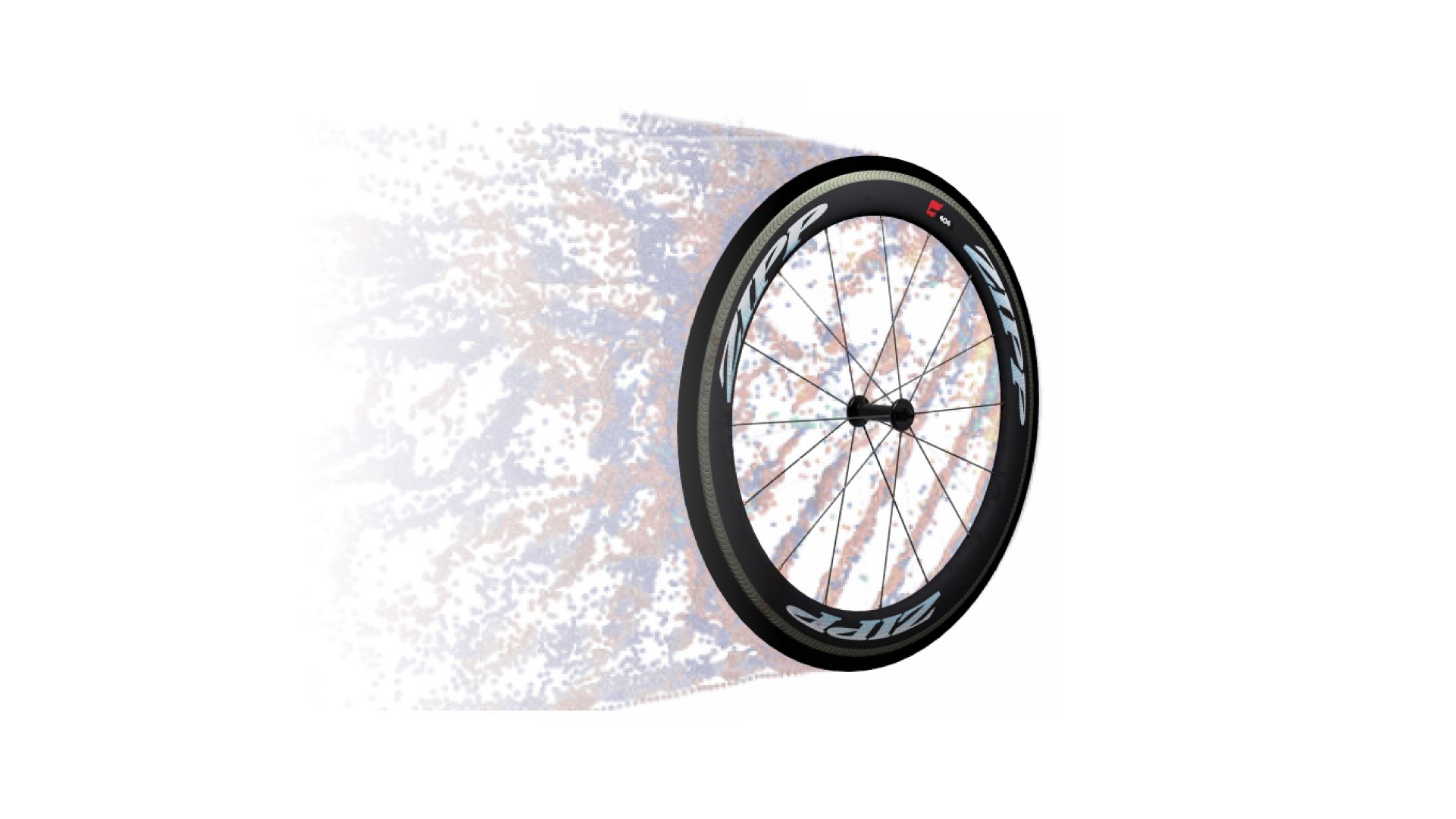
Equally important to controlling how airflow attaches to the Firestrike rim profile, is controlling how predictably the flow detaches. The new Firestrike ABLC dimple pattern was designed to work in conjunction with the rim profile resulting in a combination that is both low drag, yet very stable and predictable even in the windiest of conditions. The new wavy dimple pattern is designed to utilize 18 nodes that are specifically clocked to start shearing at a rate of 66hz at a rider speed of 17mph. The wave pattern accomplishes this by inducing small sheet vortices that shed at this low magnitude but at a higher natural frequency, decreasing the laminar bubble effect on the leeward of the profile. This high frequency shedding is less perceivable to the rider, creating less disruption, and inspiring greater confidence to hold more aero position in worse conditions.
HUB TECHNOLOGIES
Zipp’s hubsets are precision engineered to enhance the best-in-class speed, stability and stiffness of every one of our wheelsets, rim brake or disc brake. Every new Zipp wheel features a technology-rich hubset that is purpose-built for the diverse new era of road cycling.
COGNITION™
Wheel Utilized In:
303 NSW Carbon Clincher, 404 NSW Carbon Clincher, 808 NSW Carbon Clincher
77/177
Wheels Utilized In:
Rim-brake versions of 202 Tubular and 202 Firecrest Carbon Clincher, 303 Firecrest Tubular and Carbon Clincher, 808 Tubular and Carbon Clincher, 30 Course Tubular and Clincher
The addition of Zipp’s 77/177 hubset raises Firecrest to whole new level: Best-in-class durability and improved bearing protection with no pre-load adjustment needed.
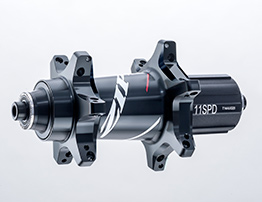
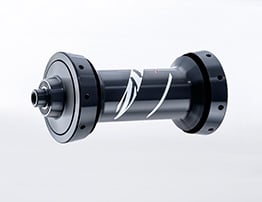
Like the rear Cognition hub found on our NSW wheels, the 177 rear hub features a star-flanged straight-pull hubshell design on the rear hub to distribute the load placed on the hub flange away from the bearings for accurate bearing bores and smooth rolling bearings regardless of spoke tension. We’ve also taken care to stack the opposing spokes on each arm of the hubshell to balance the load. This increases the fatigue life of each arm and allows us to use less material for a lighter hub. However, rather than stack the spokes directly on top of one another, we’ve offset them slightly so that the spokes do not intersect near the spoke head or adjoining shank, where the spoke is highly stressed, thereby preventing spoke breakage.
- Optimized hub flange geometry and spoke hole attachment pattern with Sapim® CX-Sprint spokes (CX-Ray for 202 Tubular) to optimize torsional and lateral stiffness while improving durability.
- New robust hub shape with distinctive graphics.
- 17mm axle.
For those looking for a wider gear range, or tackling especially extreme terrain, a XD driver body for 177 is sold separately and easily installed to allow for more cassette options including our wide range 10-42t cassette. The hubset is designed to swap driver bodies without the need to re-dish the wheel.
77/177D
Wheels Utilized In:
202 Firecrest Disc-brake Carbon Clincher Disc-brake, 303 Firecrest Disc-brake Tubular and Disc-brake Carbon Clincher, 30 Course Disc-brake Tubular and Clincher
Same advanced hubset as the 77/177, but for disc-brake wheel.
For our front hub we’ve developed a unique scalloped edge hubshell design to prevent growth of bearing bores. This scalloped design maintains the bearing bore diameter when high radial spoke tension is applied in spite of the hub’s light weight. That means you get bearings that quietly stay in place, roll faster, last longer, and provide a laterally stiffer hub.
- No set screw or bearing pre-load option. Bearings come precision set from the factory
- 17mm axle
- 10 degrees of engagement
- Swiss ABEC 5 bearings
- Rear hub 61804 drive side
- Non drive side 61903
- Front hub 61803
This product was added to our catalog on March 7, 2018

